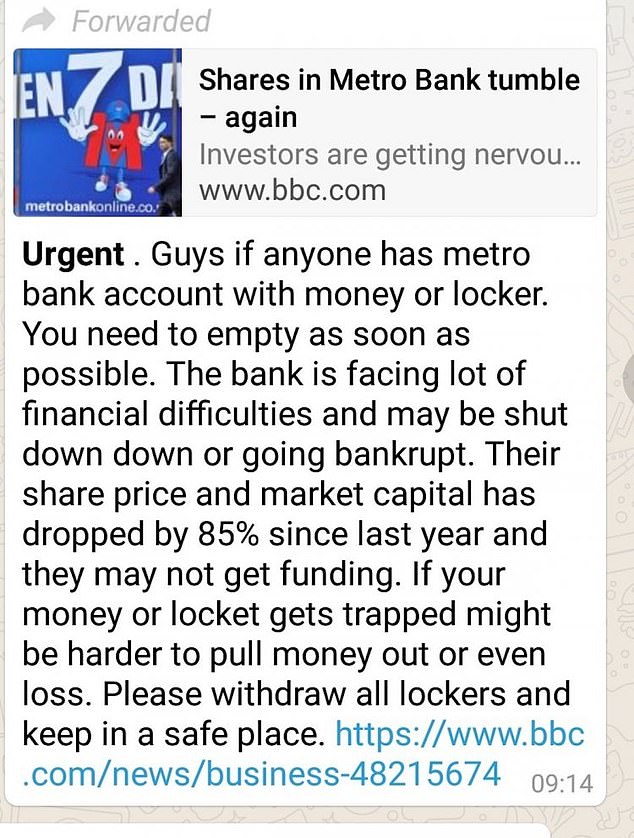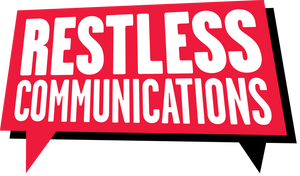Spare a thought for the comms team at Metro Bank, facing a possible run on the bank due to fake news and misinformation spread via WhatsApp.
This rumour falsely claims that the bank may shut down or go bankrupt, and advises people to close their accounts.
Metro Bank is still reeling from a very public telling-off from the regulator, following serious accounting errors. To cut a long story short, they hadn’t set aside enough ‘just-in-case’ cash to cover some of their riskier products, which they hadn’t realised were quite so risky.
Following that telling off, the bank announced it would be raising another £350m in funding – just a few months after raising £300m and telling the world it wouldn’t need any more.
City speculation was that the bank was in a bit more trouble than they were letting on. Profits and their share price have both tumbled.
It looks like some of the media coverage around these issues generated a well-meaning but inaccurate warning which circulated on WhatsApp.
That message advised Metro Bank customers to empty their accounts and safe-deposit boxes. It seemed to resonate particularly around North-West London – a part of the world with a large south Asian community, who use a lot of safe-deposit boxes.

On Saturday afternoon their were significant queues at the Harrow Branch – potentially the first sign of a major run on a UK bank since Northern Rock more than ten years ago.
So how have the Metro Bank comms team responded, and what could they have done better?
The bank’s media relations appears to have been very effective. Journalists seem well-informed enough about the banks’ inability to access safe deposit boxes and the FSCS to quell the rumours.
But the social media response from the bank seems to be much more timid.
The media responses very publicly acknowledged the increased queries about safe-deposit boxes, the increase in misinformation and “false rumours”, and reassured customers there was no need to be concerned.
But the social channels only appeared to offer those facts while responding to specific questions, rather than at any time while in broadcast mode.
The bank signposted its own web pages on the Financial Services Compensation Scheme, but didn’t appear to be providing much context on its site.
On social, however, the bank’s ‘help’ account regularly pointed out that ‘there is no reason to be concerned’, that it is profitable, ranked no 1 for customer service, has 1.7m customer accounts and had a solid start to the year.
But has never (at least not yet) talked of ‘false rumours circulating on WhatsApp’ or broadcast anything which implies it knows the background to these rumours and therefore can confidently refute them.
Suggestions for Metro Bank
An effective crisis communications response depends on finding the facts quickly, and then responding to them.
While Metro Bank very publicly said ‘There is no truth to the rumours’, they should have been more specific, along the lines of: “We are aware of rumours circulating via WhatsApp suggesting people should withdraw items from safety deposit boxes. These rumours are false. There is no need to withdraw anything at all. Although obviously, what’s in your own Safe Deposit Box is yours to do with as you choose.
Of course, there may well be sound (regulatory) reasons why Metro couldn’t be quite so bullish on social media, but in an era when false news can soon become accepted reality, businesses will increasingly have to demonstrate publicly that they’re aware of the channel, as well as the issue, so they can seem more credible than the person who originally forwarded on the message. That sort of behaviour can help to shut an issue down even quicker.
Certainly before misinformation causes a run on the bank.
We help businesses develop crisis communications strategies which can deal with fake news, false news, rumours, misinformation and deliberate lies.
From setting up systems to verify (or ignore) tweets and global events to helping hotels manage rumours of a specific family staying in one of their properties, we’ve got experience preparing for and dealing with a broad range of issues that may arise. Get in touch to discuss how we might be able to help you.


